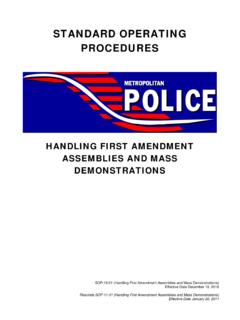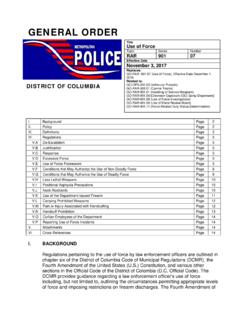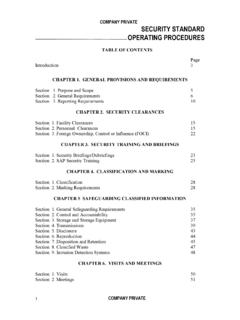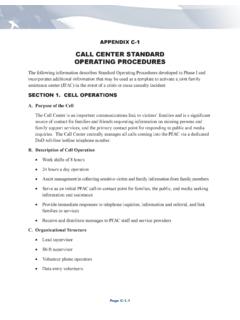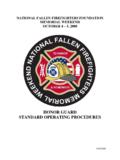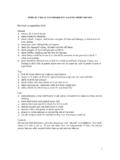Transcription of STANDARD OPERATING PROCEDURES - …
1 STANDARD OPERATING PROCEDURES HANDLING FIRST AMENDMENT ASSEMBLIES AND MASS DEMONSTRATIONS SOP-11-01 (Handling First Amendment Assemblies and Mass Demonstrations) Revised July 3, 2013 2 METROPOLITAN POLICE DEPARTMENT STANDARD OPERATING PROCEDURES HANDLING FIRST AMENDMENT ASSEMBLIES AND MASS DEMONSTRATIONS TABLE OF CONTENTS 3 SOP-11-01 (Handling First Amendment Assemblies and Mass Demonstrations) Table of Contents July 3, 2013 (SOPC-13-02) I. INTRODUCTION 4 II. POLICY 5 III. PLANNED/PERMITTED FIRST AMENDMENT ASSEMBLIES 6 IV.
2 UNPLANNED EVENTS 8 V. VIOLENT CIVIL DISTURBANCES 10 VI. ORGANIZATION OF CIVIL DISTURBANCES 13 VII. COMMAND ASSIGNNENTS AND RESPONSIBILITIES 15 VIII. FULL MOBILIZATION OF PERSONNEL IN SUPPORT OF EVENTS 17 IX. OPERATIONAL PROCEDURES FOR MASS DEMONSTRATIONS 19 X. CONSEQUENCE MANAGEMENT 25 XI. APPENDICES 26 A. JOCC/CIC Activation and Operations B. Public Information During Large Scale Events and Demonstrations C. Mass Demonstration Event Log D. Warning Format for Mass Arrests E. Pre-Mass Arrest Checklist Arrest PROCEDURES (rescinded July 3, 2013) G. PD Form 759 - Field Arrest Form H. Mass Volume Arrests and Prisoner Control System I. Legal Charges for Protests/Civil Disturbances J. Rights Notification Forms K.
3 CDU Use of Force L. Internal Investigations for Use of Force and Misconduct M. First Amendment Assembly Provisions of the First Amendment Rights and Police standards Act of 2004 N. Records Retention I. INTRODUCTION The STANDARD OPERATING PROCEDURES (SOP) outlined in this manual are to ensure that this department is prepared to respond effectively and efficiently in accordance with applicable law and District of Columbia policy to any unlawful conduct occurring in the context of First Amendment assemblies. These SOP s incorporate revisions to the manner in which the Metropolitan Police Department responds to demonstrations and other assemblies on District of Columbia public space that the District has implemented in resolving litigation. This manual also reflects measures mandated by the First Amendment Rights and Police standards Act of 2004. This handbook sets forth general policy and shall serve as STANDARD OPERATING PROCEDURES for all members in carrying out the mission of the Metropolitan Police Department in dealing with all demonstrations, rallies, marches, picket lines, or other similar gatherings conducted for the purpose of persons expressing their political, social, or religious views.
4 This policy is intended to exceed constitutional requirements and satisfy the heightened requirements of local statutory law and best practices. The manual also is designed around the concept of operational flexibility within the requirements of the National Incident Management System. It is impossible to devise specific STANDARD PROCEDURES for handling all possible situations, for each has its own characteristics and problems. The overall police philosophy must be one of moderation, flexibility and controlled response. Since each situation is unique, both commanders and supervisory officials must plan to respond according to the nature and size of the crowd. The tactical PROCEDURES established within this manual are a guide, and not a substitute for the exercise of sound judgment and proper command and supervision within the context of general departmental policy. It is imperative that members of the force understand the role of the Metropolitan Police Department during mass demonstrations and major disturbances in our city and the manner by which the department prepares itself to fulfill this role.
5 It is to this end that this handbook is dedicated. II. POLICY A. Statement of Policy It is the declared policy of the District of Columbia that persons and groups have a right to organize and participate in peaceful First Amendment assemblies on the streets, sidewalks, and other public ways, and in the parks of the District of Columbia, and to engage in First Amendment assembly near the object of their protest so they may be seen and heard, subject to reasonable restrictions designed to protect public 4safety, persons, and property, and to accommodate the interest of persons not participating in the assemblies to use the streets, sidewalks, and other public ways to travel to their intended destinations, and use the parks for recreational purposes. It is the statutory responsibility of the Metropolitan Police Department to preserve the public peace, to prevent crime, arrest offenders, and to protect the rights of persons and of property.
6 As part of this responsibility, the department provides trained personnel to respond to the scene of First Amendment assemblies in our city in order to preserve peace while protecting the constitutional and statutory rights of people to assemble peacefully and exercise free speech. In fulfilling these responsibilities, the department will make reasonable efforts to employ non-arrest methods of crowd management as the primary means of restoring order. Should such methods prove unsuccessful, arrests shall be made for violations of the law. All arrests shall be based on probable cause, and arresting officers shall use only the minimum necessary force to make and maintain the arrest. To the extent possible under the circumstances, arrests shall be made in an organized manner by units at the direction of the Chief of Police or his/her designee. All arrests shall be fully documented. Prisoners shall be safeguarded and adequately cared for, and shall be expeditiously processed for court or release.
7 The Council for the District of Columbia has enacted the First Amendment Rights and Police standards Act of 2004. This act contains First Amendment Assemblies provisions that control this department s responses to demonstrations. The Metropolitan Police Department shall comply with all provisions of this act while providing police services during any First Amendment event. The First Amendment Assemblies provisions are contained within Appendix M. It is the policy of MPD to index, retain and store all documents (originals and copies) for a period of no less than three (3) years. The provisions for the records retention are contained within Appendix N. B. Organizational Policy The Chief of Police, or an official or officer designated by him/her Directly, through operation of the chain of command, by virtue of deployment of personnel pursuant to an operational plan or in response a First Amendment assembly, or lawful order, will be the Incident Commander at scenes of First Amendment assemblies.
8 Incident Command responsibility, once established, does not pass from one officer or official to another simply by virtue of the appearance or arrival at the scene of a First Amendment assembly of an official senior in 5rank to the officer or official OPERATING as the Incident Commander. Incident Command responsibility passes in such instances only upon acceptance of that responsibility by the senior official. III. PLANNED/PERMITTED FIRST AMENDMENT ASSEMBLIES Planned events are those that the department is aware of in advance, either through the submission of a permit request or other means that allow for the advance planning of resources and response PROCEDURES . When large-scale planned/permitted First Amendment assemblies are anticipated: 1. The Chief of Police will designate command official(s) to serve as Area or Incident Commander(s) at various sites to manage events. 2. During First Amendment protected demonstrations, Incident Command responsibility, once established, does not pass from one officer to another simply by virtue of the arrival of a member of higher rank.
9 Incident Command responsibility passes only in such instances when the higher-ranking official assumes command and informs the lower ranking official. 3. The Commander, Special Operations Division, under the direction of the Chief of Police, is responsible for preparing the necessary details and tactical plans for events that are scheduled to occur within the District of Columbia. In this capacity he/she shall: a. Coordinate all aspects of the event plan with the affected elements, units and personnel; b. Coordinate activities with other law enforcement, Government and federal agencies, as necessary; and c. Designate liaison officers to deal with demonstration leaders before, during, and after the demonstration. 4. Planning Committees In order to perform its mission of protecting the rights of demonstrators, counter-demonstrators, and non-demonstrators alike, it is the policy of the MPD to engage in advance planning to facilitate demonstrations where the Department is provided advance notification through the permit application process or learns of a planned First Amendment assembly.
10 Creation of various subcommittees: The subcommittees that are convened will be dependent upon the type of event being handled. The Responsibilities of each committee shall be at the discretion 6of the Commander, Special Operations The following committees shall be considered when planning for an event: Venue Security Sanitation Crisis Management Consequence Management Transportation Traffic Legal Media Relations IV. UNPLANNED EVENTS Unplanned events are ones of which the Department has no prior knowledge. Such events may consist of spontaneous gatherings and/or large-scale demonstrations. Unplanned events are often peaceful and pose little problem for law enforcement; however, peaceful gatherings can turn violent, so contingency plans must be in place for members to respond as necessary to safeguard life and property. Response to Un-permitted First Amendment Assemblies The first officer(s) to arrive on the scene of a First Amendment Assembly is responsible for the following actions: 1.

